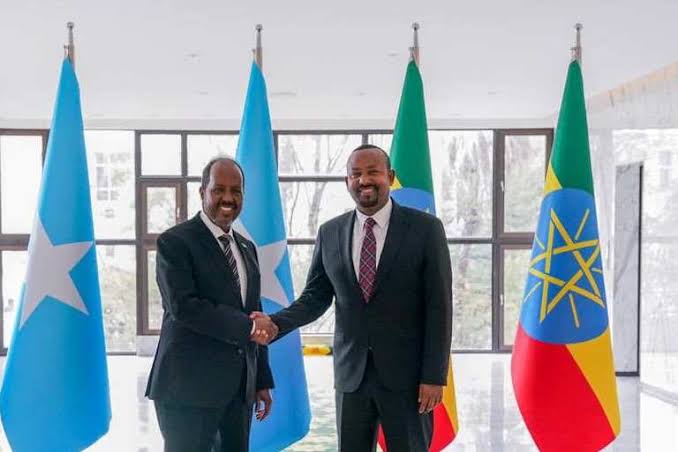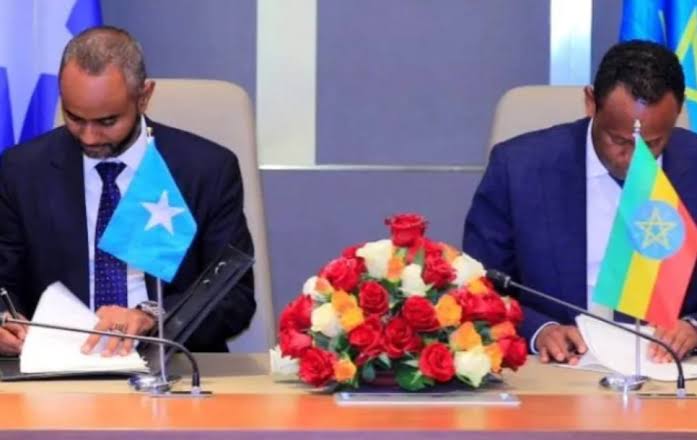Facebook Twitter (X) Instagram Somali Magazine - People's Magazine
A year after a controversial Memorandum of Understanding (MoU) sparked tensions in the Horn of Africa, Ethiopia and Somalia have made significant strides toward reconciliation. In January 2024, former Somaliland President Muse Bihi signed a deal with Ethiopian Prime Minister Abiy Ahmed, promising maritime access to landlocked Ethiopia in exchange for recognition of Somaliland’s sovereignty. However, the agreement faced swift backlash, particularly from Somalia, which viewed the deal as an infringement on its sovereignty.
Over the next 12 months, relations between Ethiopia and Somalia remained fraught. The geopolitical fallout extended beyond the two nations, drawing in regional and global powers, with Egypt and Türkiye becoming involved in the ongoing disputes. Somalia’s resistance to Ethiopian involvement in the African Union-led peacekeeping mission (AUSSOM) further complicated matters, particularly after Somalia’s representative to the UN, Mohamed Rabi Yusuf, reiterated last month that Ethiopian troops would not be included in the mission. These developments were compounded by fears of a proxy conflict between Ethiopia and Egypt, as Cairo sought to expand its military presence in Somalia.

In a surprising turn, recent weeks have seen a warming of relations between the two nations. Somalia’s President Hassan Sheikh Mohamud was received with honors in Addis Ababa last week, signaling a shift in the dynamic. This followed months of quiet diplomacy, including high-level exchanges between Ethiopian and Somali delegations. Analysts credit international mediators, particularly Türkiye, with brokering the rapprochement. With investments in both nations, Türkiye leveraged its influence to de-escalate tensions, ensuring stability in a region critical to global trade.
Observers point to several factors that facilitated this diplomatic breakthrough. Key among them was the election of a new Somaliland president, Abdirahman Mohamed Abdulahi, whose administration distanced itself from the contentious MoU. This provided Ethiopia with an opportunity to recalibrate its position. Additionally, the Ankara Declaration and broader regional diplomacy underscored Ethiopia’s desire for maritime access and Somalia’s need for security assurances.
The MoU, once seen as a flashpoint, has become a cautionary tale of the complexities of regional geopolitics. The document’s explicit mention of a naval base fueled anxieties among Somalia, Egypt, and Djibouti, all of whom have vested interests in the Red Sea and Bab el-Mandeb Strait. Ethiopia’s aspirations for a naval presence raised concerns about shifting power dynamics, prompting fears of economic and strategic losses among its neighbors.
While normalization has been framed as a win-win, experts remain skeptical of its longevity. Somalia’s internal divisions, compounded by the presence of regional states with aspirations of independence, pose challenges to lasting peace. Similarly, Ethiopia faces scrutiny over its diplomatic maneuvering, with some arguing that the MoU weakened its regional standing before the recent reconciliation.
The broader implications of these developments extend beyond Ethiopia and Somalia. Somaliland’s quest for recognition remains a contentious issue. Many experts believe that granting statehood to Somaliland would set a dangerous precedent for other secessionist movements across Africa. The African Union, wary of destabilizing the continent, has maintained its silence on the matter, viewing the potential recognition of Somaliland as a Pandora’s box.
Despite these challenges, Ethiopia has made tangible gains in its pursuit of sea access, a long-standing ambition for the landlocked nation. The recent agreement with Somalia has not only advanced Ethiopia’s maritime aspirations but also addressed mutual security concerns. Historically intertwined, the two nations share deep economic and cultural ties, which observers hope will serve as a foundation for enduring cooperation.
The diplomatic thaw between Ethiopia and Somalia highlights the intricate interplay of local, regional, and global forces shaping the Horn of Africa. While the road ahead is fraught with uncertainty, the progress made in recent weeks offers a glimmer of hope for stability in a region long plagued by conflict and political fragmentation.

